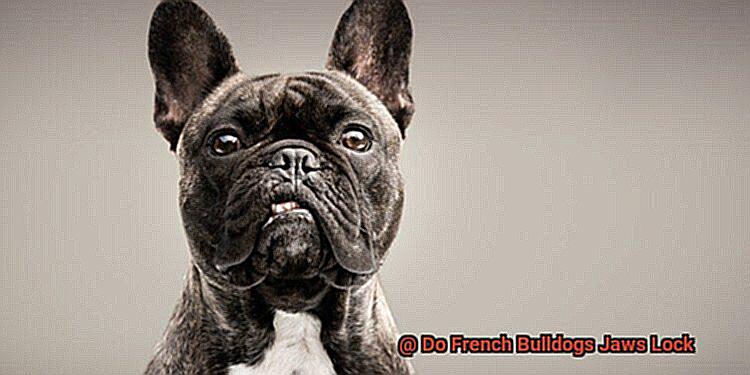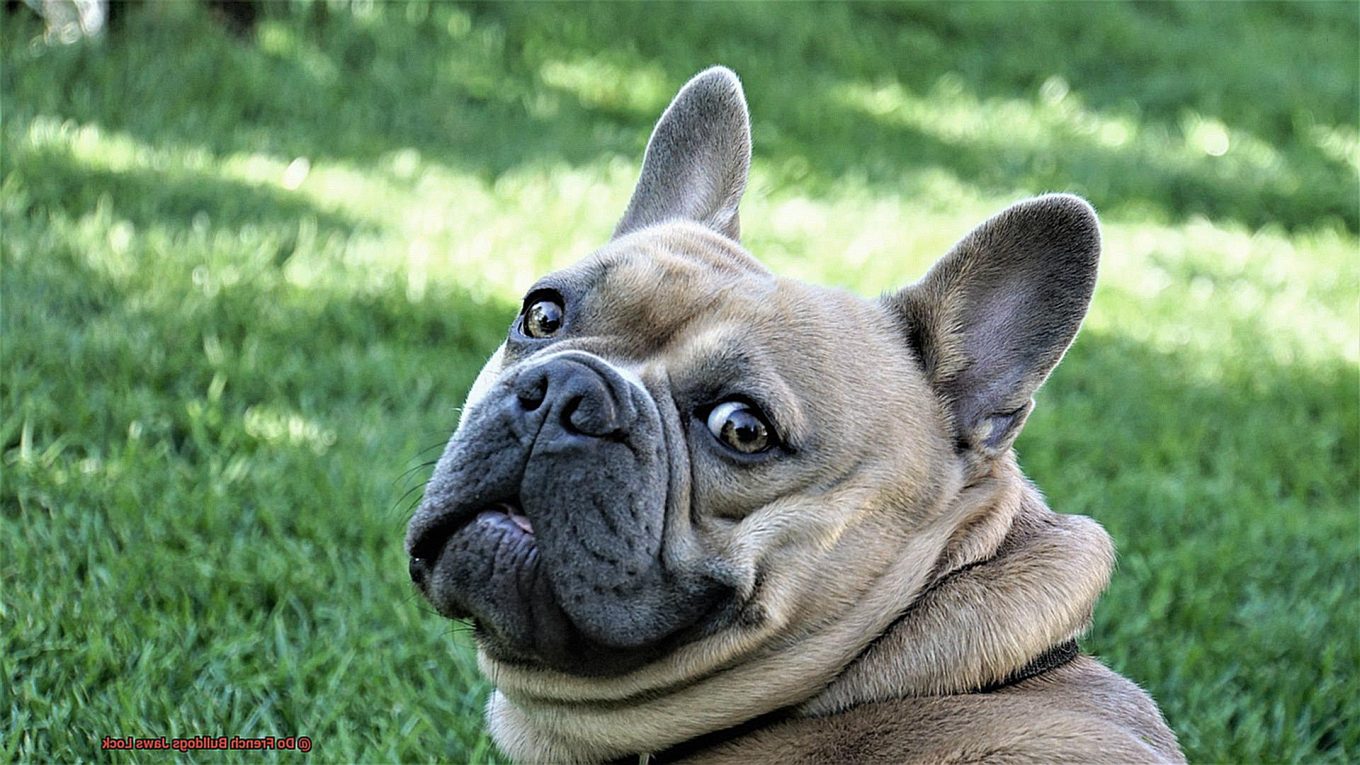Do French Bulldogs Jaws Lock?
Are you considering getting a French Bulldog as your furry companion?
If so, you may have heard the rumor that these adorable pups have jaws that lock like Pit Bulls. This statement has caused a lot of confusion and concern among pet owners, leading many to avoid adopting these lovable dogs altogether.
The truth is that this myth is entirely false.
French Bulldogs are beloved by many for their charming personalities and gentle nature. These loyal, playful canines have captured the hearts of families worldwide.
While they may not be guard dogs or hunters, their muscular build and strength can be misleading. Some people believe that French Bulldogs’ jaws are strong enough to lock, but this couldn’t be further from the truth.
Here, we will debunk this myth once and for all. We’ll provide you with factual information about the French Bulldog breed, their jaw structure, and why their jaws cannot lock.
Do French Bulldogs Have a Locking Mechanism in their Jaws?
Contents
French Bulldogs are a lovable breed of dog that has captured the hearts of many with their playful and friendly personalities.
However, there is a common myth that often surrounds this breed – that they have a locking mechanism in their jaws. As an expert on this topic, I am here to set the record straight and provide you with the real facts about French Bulldogs’ jaws.
It is important to understand that no dog breed has a locking mechanism in their jaws. This is a common misconception that likely arose from breeds such as Pit Bulls, who have strong bite forces and tenacious personalities.
However, this behavior is not due to a locking jaw mechanism, but rather their innate instinct and determination. French Bulldogs, like all dogs, have a hinged lower jaw that moves up and down, similar to humans.
The muscles and tendons surrounding their jaws are incredibly strong, allowing them to apply an immense amount of pressure when biting down. However, their jaws do not lock in place nor can they be easily dislocated.
While French Bulldogs do not have a locking mechanism in their jaws, they do possess powerful jaw muscles and determination to hold onto objects or toys with great force. This can give the impression of a locked jaw, but it is simply due to their persistence and strength.
It’s essential for French Bulldog owners to monitor their pet’s behavior and seek veterinary care if they notice any unusual symptoms or behaviors related to their dog’s jaw.
Providing appropriate toys and regularly exercising and socializing your French Bulldog can also help prevent any potential jaw-related issues.
What Causes the Impression of a Locked Jaw in French Bulldogs?
French Bulldogs are a beloved breed of dog known for their charming personalities and distinctive appearance.
However, some owners may be alarmed to see their dog’s jaw appearing stiff or locked, causing confusion and distress. As an expert on this topic, I am here to shed light on what causes the impression of a locked jaw in French Bulldogs.
One possible cause of this impression is due to their flat-faced skull structure. This unique feature can lead to elongation of the soft palate, which can negatively affect the muscles and ligaments connected to the jaw, making it appear stiff or locked.
It’s notable that this can also lead to breathing difficulties and snoring, so it’s crucial to monitor your dog’s breathing patterns and seek veterinary care if necessary. Dental issues are another cause of the impression of a locked jaw in French Bulldogs.

These dogs are predisposed to dental problems such as overcrowding, misaligned teeth, and gum disease, which can induce pain and discomfort in the jaw area. The resulting stiffness or difficulty opening the mouth can be mistaken for a locked jaw.
Lastly, genetics may also play a role in the impression of a locked jaw in French Bulldogs. Some dogs may inherit certain traits that affect the muscles and ligaments connected to their jaw, causing them to appear stiff or locked.
Is TMJ Related to a Locked Jaw in French Bulldogs?
French Bulldogs are beloved pets known for their charming personalities and unique physical attributes.
However, their skull structure can lead to a host of health issues, including a locked jaw. Temporomandibular Joint Disorder (TMJ) is one of the potential causes of a locked jaw in French Bulldogs and should not be overlooked.
The temporomandibular joint, which connects the jawbone to the skull, is vital for proper mouth movement. TMJ can cause pain and discomfort, making it challenging for French Bulldogs to open and close their mouths with ease.
This condition can also result in difficulty chewing, excessive drooling, and reluctance to eat or drink. If you suspect that your French Bulldog may be suffering from TMJ, seeking prompt veterinary care is crucial.
Treatment options may include medication, physical therapy, or even surgery in severe cases. Your veterinarian can provide an accurate diagnosis and work with you to develop a personalized treatment plan that meets your furry friend’s needs.
By staying vigilant and seeking professional advice from a veterinarian, you can ensure that your French Bulldog receives the best possible care and enjoys a happy, healthy life.
Em5WE9QFfa0″ >
How Can French Bulldog Owners Prevent Jaw-Related Issues?
French Bulldogs are a beloved breed known for their charming personalities and endearing looks.
However, as a responsible pet owner, it’s crucial to be aware of the potential jaw-related issues that can affect this breed. Frenchies are prone to brachycephalic airway syndrome and elongated soft palate due to their flat faces, which can put pressure on the jaw and cause breathing difficulties.
To prevent these issues, there are several measures that owners can take. Firstly, providing your French Bulldog with a balanced diet that is rich in nutrients can help maintain healthy bones and muscles, including those in the jaw area.
Regular exercise, such as daily walks or playtime, can also help keep the jaw muscles strong, reducing the risk of strain. Owners should also pay careful attention to their French Bulldog’s chewing habits.
Providing appropriate chew toys and avoiding hard or chewy treats can minimize the risk of tooth damage or jaw strain. Monitoring their chewing habits is also essential to prevent foreign objects from getting lodged in their mouths, which can lead to jaw locking.
Regular dental care is another crucial component of preventing jaw-related issues in French Bulldogs. Brushing their teeth regularly and scheduling professional cleanings can help prevent tooth decay and gum disease, which can cause jaw pain and discomfort.
Lastly, it is essential to be mindful of any signs of jaw-related issues, such as difficulty opening or closing the mouth or sudden changes in chewing habits. If any symptoms are present, it’s vital to seek veterinary attention promptly to prevent further complications.
Also Read: Do English Bulldogs Lock Their Jaws? – Allfrbulldogs.com
Conclusion
In conclusion, the myth that French Bulldogs have a locking mechanism in their jaws is just that – a myth.
This misconception has caused unnecessary worry and confusion among pet owners who may be hesitant to adopt these adorable dogs. However, the truth is that French Bulldogs are known for their gentle nature and loving personalities.
While they may appear muscular and strong, their jaws cannot lock. It’s important for French Bulldog owners to pay close attention to their pet’s behavior and seek veterinary care if they notice any unusual symptoms or behaviors related to their dog’s jaw.
Providing appropriate toys and ensuring your furry friend gets enough exercise and socialization can also help prevent any potential jaw-related issues.
Although French Bulldogs may give the impression of having a locked jaw due to factors such as their flat-faced skull structure, dental problems, or genetics, it’s crucial to monitor your dog’s breathing patterns and seek veterinary care if necessary.
TMJ is one possible cause of a locked jaw in French Bulldogs that should not be overlooked. Treatment options may include medication, physical therapy, or even surgery in severe cases.
To keep your French Bulldog’s jaw healthy and prevent potential issues, it’s essential to provide them with a balanced diet, regular exercise, appropriate chew toys, regular dental care, and keep an eye out for any signs of trouble.




